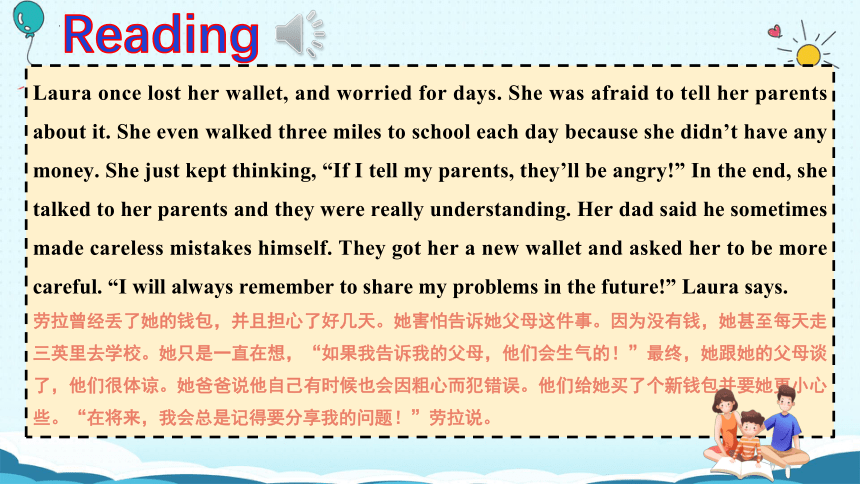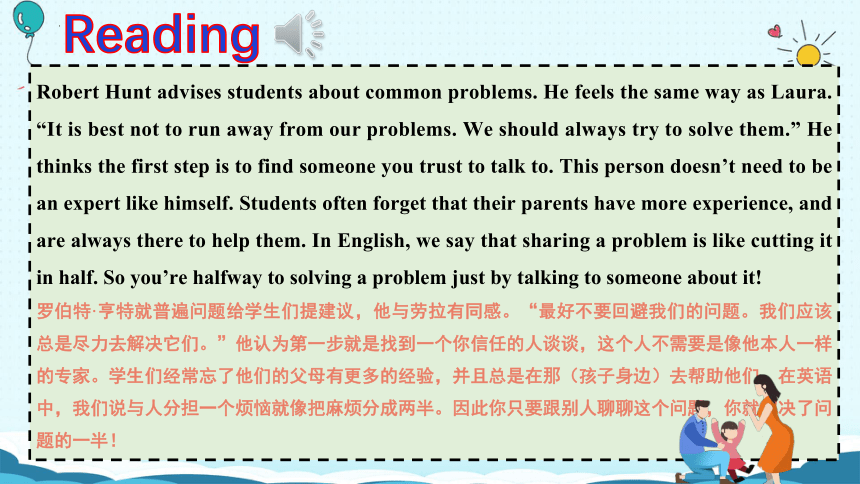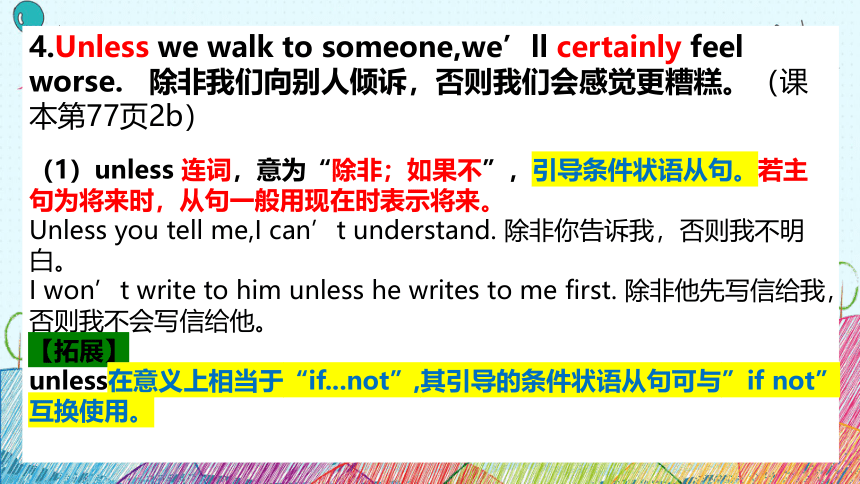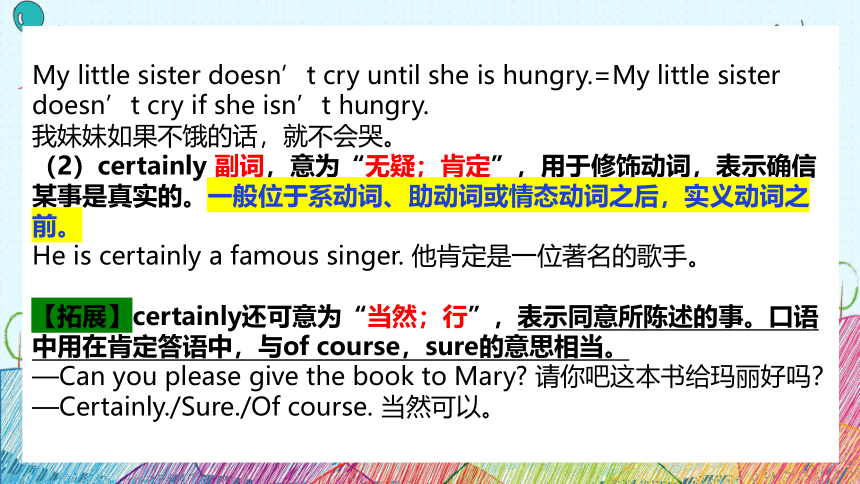Unit 10 If you go to the party, you'll have a great time!Section B 2b Reading课文知识点串讲课件(共25张PPT,内嵌音频)
文档属性
| 名称 | Unit 10 If you go to the party, you'll have a great time!Section B 2b Reading课文知识点串讲课件(共25张PPT,内嵌音频) |  | |
| 格式 | zip | ||
| 文件大小 | 3.8MB | ||
| 资源类型 | 教案 | ||
| 版本资源 | 人教新目标(Go for it)版 | ||
| 科目 | 英语 | ||
| 更新时间 | 2022-10-10 15:41:49 | ||
图片预览









文档简介
(共25张PPT)
Unit10 If you go to the party,you’ll have a good time!
Section B 2b Reading课文知识点串讲
Students these days often have a lot of worries. Sometimes they have problems with their schoolwork, and sometimes with their friends. What can they do about this Some people believe the worst thing is to do nothing. Laura Mills, a teenager from London, agrees. “Problems and worries are normal in life,” says Laura. “But I think talking to someone helps a lot. Unless we talk to someone, we’ll certainly feel worse.”
现今的学生经常有很多烦恼。有时候他们在学业方面有问题,有时候与朋友们有矛盾。就此他们能做什么呢?有些人认为最糟糕的事情就是什么也不做。劳拉·米尔斯,一个来自伦敦的青少年,表示认同。“在生活中,有问题和烦恼是正常的,”劳拉说。“但是我认为跟别人谈谈帮助很大。除非我们找人谈谈,否则我们肯定会感觉更糟糕。”
Reading
Laura once lost her wallet, and worried for days. She was afraid to tell her parents about it. She even walked three miles to school each day because she didn’t have any money. She just kept thinking, “If I tell my parents, they’ll be angry!” In the end, she talked to her parents and they were really understanding. Her dad said he sometimes made careless mistakes himself. They got her a new wallet and asked her to be more careful. “I will always remember to share my problems in the future!” Laura says.
劳拉曾经丢了她的钱包,并且担心了好几天。她害怕告诉她父母这件事。因为没有钱,她甚至每天走三英里去学校。她只是一直在想,“如果我告诉我的父母,他们会生气的!”最终,她跟她的父母谈了,他们很体谅。她爸爸说他自己有时候也会因粗心而犯错误。他们给她买了个新钱包并要她更小心些。“在将来,我会总是记得要分享我的问题!”劳拉说。
Reading
Robert Hunt advises students about common problems. He feels the same way as Laura. “It is best not to run away from our problems. We should always try to solve them.” He thinks the first step is to find someone you trust to talk to. This person doesn’t need to be an expert like himself. Students often forget that their parents have more experience, and are always there to help them. In English, we say that sharing a problem is like cutting it in half. So you’re halfway to solving a problem just by talking to someone about it!
罗伯特·亨特就普遍问题给学生们提建议,他与劳拉有同感。“最好不要回避我们的问题。我们应该总是尽力去解决它们。”他认为第一步就是找到一个你信任的人谈谈,这个人不需要是像他本人一样的专家。学生们经常忘了他们的父母有更多的经验,并且总是在那(孩子身边)去帮助他们。在英语中,我们说与人分担一个烦恼就像把麻烦分成两半。因此你只要跟别人聊聊这个问题,你就解决了问题的一半!
Reading
1.If people have problems,they should keep them to themselves. 如果人们有问题,他们应该保守秘密。(课本第77页2b)
keep... to oneself 表示“保守秘密;不将......说出去”。
Don’t tell it to others;please keep it to yourself. 别把这件事告诉别人;请你保守秘密。
She always keeps her ideas to herself.
她总是不把自己的想法告诉别人。
【拓展】
keep the secret for sb. 意为“为某人保守秘密”。
Thank you so much for keeping the scret for me. 非常感谢你为我保守秘密。
2.Some people believe the worst thing is to do nothing. 一些人认为最坏的事情就是什么事情也不做。(课本第77页2b)
to do nothing 为动词不定式短语,在句中作表语。
动词不定式短语可以放在系动词后面作表语,表示按计划、安排等要发生的事情。
My dream is to be a scientist. 我的梦想是当一名科学家。
3.”Problems and worries are normal in life,”says Laura. “问题和烦恼在生活中是正常的,“劳拉说。(课本第77页2b)
normal 形容词,意为”正常的;一般的“,
无比较级和最高级形式,在句中作表语,也可作定语。
It’s normal to feel tired after such a long trip.
这样长途旅行之后感到疲劳是正常的。
4.Unless we walk to someone,we’ll certainly feel worse. 除非我们向别人倾诉,否则我们会感觉更糟糕。(课本第77页2b)
(1)unless 连词,意为“除非;如果不”,引导条件状语从句。若主句为将来时,从句一般用现在时表示将来。
Unless you tell me,I can’t understand. 除非你告诉我,否则我不明白。
I won’t write to him unless he writes to me first. 除非他先写信给我,否则我不会写信给他。
【拓展】
unless在意义上相当于“if...not”,其引导的条件状语从句可与”if not”互换使用。
My little sister doesn’t cry until she is hungry.=My little sister doesn’t cry if she isn’t hungry.
我妹妹如果不饿的话,就不会哭。
(2)certainly 副词,意为“无疑;肯定”,用于修饰动词,表示确信某事是真实的。一般位于系动词、助动词或情态动词之后,实义动词之前。
He is certainly a famous singer. 他肯定是一位著名的歌手。
【拓展】certainly还可意为“当然;行”,表示同意所陈述的事。口语中用在肯定答语中,与of course,sure的意思相当。
—Can you please give the book to Mary 请你吧这本书给玛丽好吗?
—Certainly./Sure./Of course. 当然可以。
5.Laura once lost her wallet,and worried for days. 劳拉曾经丢了钱包,担心了好多天。(课本第77页2b)
(1)wallet 名词,意为“钱包”。
I want to give a wallet as a birthday present to my brother. 我想送给哥哥一个钱包作为生日礼物。
【辨析】 wallet 与 purseunless
(2)worry 此处用作不及物动词,意为“担心,发愁”,后接宾语时常跟介词about,表示“为......担心”。
wallet 指放钞票、信用卡的钱包、皮夹子,往往是折叠式的,多为男士使用
purse 尤指女士用来放硬币、钞票、信用卡的钱包、皮夹子
Tell them not to worry. 告诉他们不要担心。
Don’t worry about him.He is fine now. 不要为他担心。他现在很好。
【拓展】 worry和worried的用法
worry: 用做可数名词,意为“烦恼”,其复数形式为worries。
Your worry is always about some small things. 你总是为一些小事烦恼。
worried: 形容词,意为“担心的;发愁的”。be worried about表示“为......而担心”。
Don’t be so worried.Everything will be good. 不要如此担心。一切都会好起来的。
6.She even walked three miles to school each day because she didn’t have money. 因为没有钱,她甚至每天步行三英里去上学。(课本第77页2b)
mile 为可数名词,意为“英里”,其复数形式为miles。
He swam a mile yesterday. 昨天他游了一英里。
【拓展】
表示距离(mile, meter, kilometer...)、时间(hour, month,year...)、金钱(dollar,cent,pound...)等度量的复数名词做主语时,一般看做一个整体,谓语动词要用单数形式。
Fifteen miles is really a long way for me. 十五英里对我来说的确是很远的路程。
7.She just kept thinking,”If I tell me parents,they will be angry!” 她一直在想:“如果我告诉父母的话,他们会生气的!”(课本第77页2b)
angry 为形容词,意为“发怒的;生气的”,作表语或定语。
My father got angry when I broke the window. 我把窗户打破了,父亲很生气。
【辨析】be angry with 与 be angry at/about
be angry with 后跟人做宾语,表示“生某人的气”
be angry at/about 后接表示“言行”的名词、代词、动词-ing形式或what从句,表示“因某事而生气”
8.In the end,she talked to her parents and they were really understanding. 最后,她告诉了父母这件事,他们非常理解。(课本第77页2b)
understanding做形容词,意为“善解人意的;体谅人的”,其动词形式为understand。
She is an understanding girl. 她是一个善解人意的女孩。
【拓展】
understanding 还可做名词,意为“理解;谅解”。
She showed great love and understanding. 她表现出极大地爱和理解。
9.Her dad said he sometimes made careless mistakes himself. 她爸爸说他自己有时也粗心的错误。(课本第77页2b)
(1)careless 为形容词,意为“粗心的;不小心的”,可作定语或表语,其反义词为careful。
He is a careless boy. He always does thing carelssly. 他是一个粗心大意的男孩,做事总是粗心大意。
(2)mistake 可数名词,意为“错误;失误”。
常见搭配:
make a mistake “犯错误“;
make a mistake in sth. ”在某一方面出错“。
He often makes mistakes in grammar. 他经常在语法上出错。
【拓展】
by mistake 意为“错误地”。
He took the umbrella by mistake. 他错拿了那把伞。
(3)himself反身代词,意为“他自己”,在句中做主语he的同位语。反身代词可做主语或宾语的同位语,起强调作用,表示“自己,亲自”,做主语的同位语时,反身代词可放在主语之后或句末。
They themselves planted the trees. =They plantd the trees themselves. 他们亲自种了树。
10.They got her a new wallet and asked her to be more careful. 他们给她买了一个新钱包,还让她再小心些。(课本第77页2b)
careful 形容词,意为“小心的;细致的;精心的;慎重的”,其副词形式为carefully。
be careful 单独使用时,意为“小心”,相当于take care 或look out,常用在祈使句中.
Be careful!You will hit that car. 当心! 你要撞上那辆汽车了。
【拓展】
be careful of/about: 当心,留意
be careful in doing sth. :做某事时要小心
be careful (not) to do sth: 当心/留意(不要)做某事
11.Robert Hunt advises students about common problems. 罗伯特亨特就常见的问题给学生们提出了建议。(课本第77页2b)
advice 作及物动词,意为“劝告;建议”。
advise sb. about sth. 意为“就某事向某人提出建议”。
He advised us about the eating habits. 他就饮食习惯向我们提出了建议。
【拓展】advise的常见搭配
★①advise sb. (not) to do sth. 意为“建议某人(不要)做某事”。
He advised me to buy a computer. 他建议我买台电脑。
★②advise doing sth. 意为“建议做某事”。
He advised leaving early. 他建议早点儿动身。
12.It is best not to run away from our problems. 最好不要逃避我们的问题。(课本第77页2b)
(1)It is best (not) to do sth. 表示“最好(不要)做某事”,其中it为形式主语,真正的主语为动词不定式短语。
It’s best not to talk about money with your friends. 最好不要和你的朋友们谈钱。
(2)run away 表示“跑开”;
run away from 表示“从,,,跑开;逃避”。
The cat quickly ran away.
这只猫迅速跑开了。
Why did you run away from home
你为什么离家出走?
13.We should always try to solve them. 我们应该总是尽力去解决问题。(课本第77页2b)
solve 动词,意为“解决;解答;处理”,强调找到处理问题的方法,解决困难或难题。
Will you please help me to solve this math problem
请你帮我解决这道数学难题好吗?
【辨析】solve与 answer
solve 常与problem搭配,表示解决难度较大的问题
answer 常与question搭配,表示回答难度较小的问题
14.He thinks the first step is to find someoneyou trust to talk to. 他认为第一步是找一个信任的人倾诉。(课本第77页2b)
(1)step 此处用作可数名词,意为“步骤;步”。
What’s the next step 下一步是什么?
【拓展】step的其他用法
★①step用做可数名词,还可表示“迈步;脚步声”。
Nick took two steps forward and then stopped. 尼克向前走了两步,然后停了下来。
★②step用做可数名词,还可表示“台阶;梯级”。
The child is climbing up the steps. 那个小孩正在爬台阶。
★③step 还可用作不及物动词,意为“迈步;行走;踏;踩”。
He stepped forward. 他向前走去。
Ouch! You stepped on my foot. 哎呦!你踩着我的脚了!
(2)trust此处用作及物动词,意为“相信;信任”,后接名词或代词做宾语。
We always trust him. 我们一直信任他。
【辨析】trust 与believe
We cannot trust him. 我们不能信任他。
I believe you. 我相信你所说的。
trust 强调“信任;信赖”,侧重于人的品质,能力,相当于believe in,但语气较重,表示“深信不疑”
believe 表示相信某人所说的话(但不一定相信此人)
15.Students often forget that their parents have more experience,and are always there to help them. 学生们经常忘记这一点:他们的父母有更多的经验,而且总是随时给予他们的帮助。(课本第77页2b)
experience 此处用作不可数名词,意为“经验”,表示做某事的经验时,其后常接in doing sth.
He is a teacher with 30 years’ experience. 他是一位有着三十年教学经验的老师。
Mr.Wang has so much experience in teaching. 王先生在教学方面有非常丰富的经验。
【拓展】
experience 用做可数名词,意为“经历”。
James has a lot of unusual experience. 詹姆斯有很多不寻常的经历。
16.So you’re halfway to solving a problem just by talking to someone about it! 所以,你只要向其他人倾诉一下问题,你就已经解决了问题的一半!(课本第77页2b)
halfway 此处用作副词,意为“在中途;部分地区(或达到)”。
What else can you see on the wall 在墙上你还能看到什么?
Is anyone else going to the camp 还有其他人去参加野营吗?
【辨析】 else 与 other
else:修饰疑问代词或不定代词,置于被修饰词之后
other:修饰名词,置于名词之前
Thank you
Unit10 If you go to the party,you’ll have a good time!
Section B 2b Reading课文知识点串讲
Students these days often have a lot of worries. Sometimes they have problems with their schoolwork, and sometimes with their friends. What can they do about this Some people believe the worst thing is to do nothing. Laura Mills, a teenager from London, agrees. “Problems and worries are normal in life,” says Laura. “But I think talking to someone helps a lot. Unless we talk to someone, we’ll certainly feel worse.”
现今的学生经常有很多烦恼。有时候他们在学业方面有问题,有时候与朋友们有矛盾。就此他们能做什么呢?有些人认为最糟糕的事情就是什么也不做。劳拉·米尔斯,一个来自伦敦的青少年,表示认同。“在生活中,有问题和烦恼是正常的,”劳拉说。“但是我认为跟别人谈谈帮助很大。除非我们找人谈谈,否则我们肯定会感觉更糟糕。”
Reading
Laura once lost her wallet, and worried for days. She was afraid to tell her parents about it. She even walked three miles to school each day because she didn’t have any money. She just kept thinking, “If I tell my parents, they’ll be angry!” In the end, she talked to her parents and they were really understanding. Her dad said he sometimes made careless mistakes himself. They got her a new wallet and asked her to be more careful. “I will always remember to share my problems in the future!” Laura says.
劳拉曾经丢了她的钱包,并且担心了好几天。她害怕告诉她父母这件事。因为没有钱,她甚至每天走三英里去学校。她只是一直在想,“如果我告诉我的父母,他们会生气的!”最终,她跟她的父母谈了,他们很体谅。她爸爸说他自己有时候也会因粗心而犯错误。他们给她买了个新钱包并要她更小心些。“在将来,我会总是记得要分享我的问题!”劳拉说。
Reading
Robert Hunt advises students about common problems. He feels the same way as Laura. “It is best not to run away from our problems. We should always try to solve them.” He thinks the first step is to find someone you trust to talk to. This person doesn’t need to be an expert like himself. Students often forget that their parents have more experience, and are always there to help them. In English, we say that sharing a problem is like cutting it in half. So you’re halfway to solving a problem just by talking to someone about it!
罗伯特·亨特就普遍问题给学生们提建议,他与劳拉有同感。“最好不要回避我们的问题。我们应该总是尽力去解决它们。”他认为第一步就是找到一个你信任的人谈谈,这个人不需要是像他本人一样的专家。学生们经常忘了他们的父母有更多的经验,并且总是在那(孩子身边)去帮助他们。在英语中,我们说与人分担一个烦恼就像把麻烦分成两半。因此你只要跟别人聊聊这个问题,你就解决了问题的一半!
Reading
1.If people have problems,they should keep them to themselves. 如果人们有问题,他们应该保守秘密。(课本第77页2b)
keep... to oneself 表示“保守秘密;不将......说出去”。
Don’t tell it to others;please keep it to yourself. 别把这件事告诉别人;请你保守秘密。
She always keeps her ideas to herself.
她总是不把自己的想法告诉别人。
【拓展】
keep the secret for sb. 意为“为某人保守秘密”。
Thank you so much for keeping the scret for me. 非常感谢你为我保守秘密。
2.Some people believe the worst thing is to do nothing. 一些人认为最坏的事情就是什么事情也不做。(课本第77页2b)
to do nothing 为动词不定式短语,在句中作表语。
动词不定式短语可以放在系动词后面作表语,表示按计划、安排等要发生的事情。
My dream is to be a scientist. 我的梦想是当一名科学家。
3.”Problems and worries are normal in life,”says Laura. “问题和烦恼在生活中是正常的,“劳拉说。(课本第77页2b)
normal 形容词,意为”正常的;一般的“,
无比较级和最高级形式,在句中作表语,也可作定语。
It’s normal to feel tired after such a long trip.
这样长途旅行之后感到疲劳是正常的。
4.Unless we walk to someone,we’ll certainly feel worse. 除非我们向别人倾诉,否则我们会感觉更糟糕。(课本第77页2b)
(1)unless 连词,意为“除非;如果不”,引导条件状语从句。若主句为将来时,从句一般用现在时表示将来。
Unless you tell me,I can’t understand. 除非你告诉我,否则我不明白。
I won’t write to him unless he writes to me first. 除非他先写信给我,否则我不会写信给他。
【拓展】
unless在意义上相当于“if...not”,其引导的条件状语从句可与”if not”互换使用。
My little sister doesn’t cry until she is hungry.=My little sister doesn’t cry if she isn’t hungry.
我妹妹如果不饿的话,就不会哭。
(2)certainly 副词,意为“无疑;肯定”,用于修饰动词,表示确信某事是真实的。一般位于系动词、助动词或情态动词之后,实义动词之前。
He is certainly a famous singer. 他肯定是一位著名的歌手。
【拓展】certainly还可意为“当然;行”,表示同意所陈述的事。口语中用在肯定答语中,与of course,sure的意思相当。
—Can you please give the book to Mary 请你吧这本书给玛丽好吗?
—Certainly./Sure./Of course. 当然可以。
5.Laura once lost her wallet,and worried for days. 劳拉曾经丢了钱包,担心了好多天。(课本第77页2b)
(1)wallet 名词,意为“钱包”。
I want to give a wallet as a birthday present to my brother. 我想送给哥哥一个钱包作为生日礼物。
【辨析】 wallet 与 purseunless
(2)worry 此处用作不及物动词,意为“担心,发愁”,后接宾语时常跟介词about,表示“为......担心”。
wallet 指放钞票、信用卡的钱包、皮夹子,往往是折叠式的,多为男士使用
purse 尤指女士用来放硬币、钞票、信用卡的钱包、皮夹子
Tell them not to worry. 告诉他们不要担心。
Don’t worry about him.He is fine now. 不要为他担心。他现在很好。
【拓展】 worry和worried的用法
worry: 用做可数名词,意为“烦恼”,其复数形式为worries。
Your worry is always about some small things. 你总是为一些小事烦恼。
worried: 形容词,意为“担心的;发愁的”。be worried about表示“为......而担心”。
Don’t be so worried.Everything will be good. 不要如此担心。一切都会好起来的。
6.She even walked three miles to school each day because she didn’t have money. 因为没有钱,她甚至每天步行三英里去上学。(课本第77页2b)
mile 为可数名词,意为“英里”,其复数形式为miles。
He swam a mile yesterday. 昨天他游了一英里。
【拓展】
表示距离(mile, meter, kilometer...)、时间(hour, month,year...)、金钱(dollar,cent,pound...)等度量的复数名词做主语时,一般看做一个整体,谓语动词要用单数形式。
Fifteen miles is really a long way for me. 十五英里对我来说的确是很远的路程。
7.She just kept thinking,”If I tell me parents,they will be angry!” 她一直在想:“如果我告诉父母的话,他们会生气的!”(课本第77页2b)
angry 为形容词,意为“发怒的;生气的”,作表语或定语。
My father got angry when I broke the window. 我把窗户打破了,父亲很生气。
【辨析】be angry with 与 be angry at/about
be angry with 后跟人做宾语,表示“生某人的气”
be angry at/about 后接表示“言行”的名词、代词、动词-ing形式或what从句,表示“因某事而生气”
8.In the end,she talked to her parents and they were really understanding. 最后,她告诉了父母这件事,他们非常理解。(课本第77页2b)
understanding做形容词,意为“善解人意的;体谅人的”,其动词形式为understand。
She is an understanding girl. 她是一个善解人意的女孩。
【拓展】
understanding 还可做名词,意为“理解;谅解”。
She showed great love and understanding. 她表现出极大地爱和理解。
9.Her dad said he sometimes made careless mistakes himself. 她爸爸说他自己有时也粗心的错误。(课本第77页2b)
(1)careless 为形容词,意为“粗心的;不小心的”,可作定语或表语,其反义词为careful。
He is a careless boy. He always does thing carelssly. 他是一个粗心大意的男孩,做事总是粗心大意。
(2)mistake 可数名词,意为“错误;失误”。
常见搭配:
make a mistake “犯错误“;
make a mistake in sth. ”在某一方面出错“。
He often makes mistakes in grammar. 他经常在语法上出错。
【拓展】
by mistake 意为“错误地”。
He took the umbrella by mistake. 他错拿了那把伞。
(3)himself反身代词,意为“他自己”,在句中做主语he的同位语。反身代词可做主语或宾语的同位语,起强调作用,表示“自己,亲自”,做主语的同位语时,反身代词可放在主语之后或句末。
They themselves planted the trees. =They plantd the trees themselves. 他们亲自种了树。
10.They got her a new wallet and asked her to be more careful. 他们给她买了一个新钱包,还让她再小心些。(课本第77页2b)
careful 形容词,意为“小心的;细致的;精心的;慎重的”,其副词形式为carefully。
be careful 单独使用时,意为“小心”,相当于take care 或look out,常用在祈使句中.
Be careful!You will hit that car. 当心! 你要撞上那辆汽车了。
【拓展】
be careful of/about: 当心,留意
be careful in doing sth. :做某事时要小心
be careful (not) to do sth: 当心/留意(不要)做某事
11.Robert Hunt advises students about common problems. 罗伯特亨特就常见的问题给学生们提出了建议。(课本第77页2b)
advice 作及物动词,意为“劝告;建议”。
advise sb. about sth. 意为“就某事向某人提出建议”。
He advised us about the eating habits. 他就饮食习惯向我们提出了建议。
【拓展】advise的常见搭配
★①advise sb. (not) to do sth. 意为“建议某人(不要)做某事”。
He advised me to buy a computer. 他建议我买台电脑。
★②advise doing sth. 意为“建议做某事”。
He advised leaving early. 他建议早点儿动身。
12.It is best not to run away from our problems. 最好不要逃避我们的问题。(课本第77页2b)
(1)It is best (not) to do sth. 表示“最好(不要)做某事”,其中it为形式主语,真正的主语为动词不定式短语。
It’s best not to talk about money with your friends. 最好不要和你的朋友们谈钱。
(2)run away 表示“跑开”;
run away from 表示“从,,,跑开;逃避”。
The cat quickly ran away.
这只猫迅速跑开了。
Why did you run away from home
你为什么离家出走?
13.We should always try to solve them. 我们应该总是尽力去解决问题。(课本第77页2b)
solve 动词,意为“解决;解答;处理”,强调找到处理问题的方法,解决困难或难题。
Will you please help me to solve this math problem
请你帮我解决这道数学难题好吗?
【辨析】solve与 answer
solve 常与problem搭配,表示解决难度较大的问题
answer 常与question搭配,表示回答难度较小的问题
14.He thinks the first step is to find someoneyou trust to talk to. 他认为第一步是找一个信任的人倾诉。(课本第77页2b)
(1)step 此处用作可数名词,意为“步骤;步”。
What’s the next step 下一步是什么?
【拓展】step的其他用法
★①step用做可数名词,还可表示“迈步;脚步声”。
Nick took two steps forward and then stopped. 尼克向前走了两步,然后停了下来。
★②step用做可数名词,还可表示“台阶;梯级”。
The child is climbing up the steps. 那个小孩正在爬台阶。
★③step 还可用作不及物动词,意为“迈步;行走;踏;踩”。
He stepped forward. 他向前走去。
Ouch! You stepped on my foot. 哎呦!你踩着我的脚了!
(2)trust此处用作及物动词,意为“相信;信任”,后接名词或代词做宾语。
We always trust him. 我们一直信任他。
【辨析】trust 与believe
We cannot trust him. 我们不能信任他。
I believe you. 我相信你所说的。
trust 强调“信任;信赖”,侧重于人的品质,能力,相当于believe in,但语气较重,表示“深信不疑”
believe 表示相信某人所说的话(但不一定相信此人)
15.Students often forget that their parents have more experience,and are always there to help them. 学生们经常忘记这一点:他们的父母有更多的经验,而且总是随时给予他们的帮助。(课本第77页2b)
experience 此处用作不可数名词,意为“经验”,表示做某事的经验时,其后常接in doing sth.
He is a teacher with 30 years’ experience. 他是一位有着三十年教学经验的老师。
Mr.Wang has so much experience in teaching. 王先生在教学方面有非常丰富的经验。
【拓展】
experience 用做可数名词,意为“经历”。
James has a lot of unusual experience. 詹姆斯有很多不寻常的经历。
16.So you’re halfway to solving a problem just by talking to someone about it! 所以,你只要向其他人倾诉一下问题,你就已经解决了问题的一半!(课本第77页2b)
halfway 此处用作副词,意为“在中途;部分地区(或达到)”。
What else can you see on the wall 在墙上你还能看到什么?
Is anyone else going to the camp 还有其他人去参加野营吗?
【辨析】 else 与 other
else:修饰疑问代词或不定代词,置于被修饰词之后
other:修饰名词,置于名词之前
Thank you
同课章节目录
- Unit 1 Where did you go on vacation?
- Section A
- Section B
- Unit 2 How often do you exercise?
- Section A
- Section B
- Unit 3 I'm more outgoing than my sister.
- Section A
- Section B
- Unit 4 What's the best movie theater?
- Section A
- Section B
- Unit 5 Do you want to watch a game show?
- Section A
- Section B
- Unit 6 I'm going to study computer science.
- Section A
- Section B
- Unit 7 Will people have robots?
- Section A
- Section B
- Unit 8 How do you make a banana milk shake?
- Section A
- Section B
- Unit 9 Can you come to my party?
- Section A
- Section B
- Unit 10 If you go to the party, you'll have a grea
- Section A
- Section B
